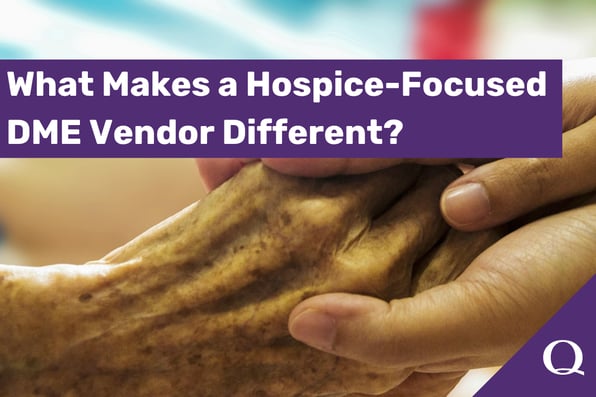What Makes a Hospice-Focused DME Vendor Different?

The transition to hospice care is a significant turning point for patients and their loved ones. A patient and everyone around them need to be treated with the highest level of kindness and compassion during an emotionally draining time.
In hospice specifically, DME vendors can be invaluable partners in delivering responsive hospice services, but not all DME vendors have experience with the specific needs of hospice providers and their patients. That’s why hospices should look for DME partners that have hospice-focused services for comprehensive end-of-life care in their repertoire.
Understanding the Hospice Model of Care
Hospice care occupies a unique place in the continuum of care. While the goal of hospice is to provide comfort measures, not treatment, it comes with a particular level of urgency. Hospice providers must be responsive to patients’ needs so that patients don’t face unnecessary suffering or their families face additional stress due to avoidable administrative or logistical issues.
Hospice patients need palliative care delivered by providers who can respond swiftly to their changing needs for pain relief, oxygen support, pressure-relief bedding, and other comfort care. Delays in care can leave patients struggling with unnecessary discomfort.
Families rely on hospice to manage the logistics of care so they can spend time with their loved one. All hospice providers and their DME partners know it's vital to be sensitive to the circumstances surrounding the work they do.
DME vendors who don’t understand the urgency of hospice care may not respond to orders in a timely manner. This can result in delayed deliveries and equipment errors that could compromise patient care. Not only would that create undue stress for patients and their families, but it can also reflect poorly on hospice providers and negatively impact CAHPS feedback.
Why It Matters in Hospice
Hospice care environments are often rapidly changing due to policy and technological shifts. This makes having a robust improvement plan in place all the more important. By utilizing hard data gathered from a systemic, step-by-step approach, the PDCA cycle creates a solid foundation for a CMS-compliant continuous improvement process. An increased emphasis on positive change enhances overall quality of care and increases patient and family satisfaction, leading to reduced costs and elevated growth for hospice programs.
Hospice care involves as much business as it does healthcare. Qualis offers behind-the-scenes operational support along with a robust DME vendor network.
General DMS Vendors vs. Hospice-Specific Partners
General DME vendors offer a wide range of equipment to various clients, including individuals, nursing homes, and home health agencies. To manage costs, they may set delivery routes where they drop off orders to multiple clients in a specific geographic area on a particular day. Pick-ups may follow a similar schedule.
They may also have last-minute inventory changes. That can lead to equipment substitutions or delays in equipment delivery.
For some DME clients, this system is workable, but it’s not compatible with hospice care. Hospice providers need vendors to proceed with delivery as soon as an order has been placed. If there is difficulty getting the right equipment, hospice providers need immediate notification so they can consider other procurement options.
The Value of Hospice-Aligned Expertise
Hospice providers can benefit from partnering with DME vendors that understand the nature of hospice services. Experienced hospice equipment partners can provide expedited deliveries, prompt pick-ups, and accessible equipment support.
Hospice-aligned vendors are also familiar with the administrative aspects of care. They can ensure that they adhere to Standards of Care so hospice providers don’t have to deal with compliance issues.
In addition, they're aware of how DME procurement can affect CAHPS scores. Families often consider hospice providers and hospice equipment suppliers as a single entity when reviewing services. Providers receive better scores when they work with hospice DME vendors who meet patient expectations.
Must-Have Qualities in a Hospice-Focused Vendor
Look for DME vendors who can consistently meet the specific DME needs for end-of-life care. The top qualities that hospice providers should look for include:
24/7 Delivery and tech support
Hospice services provide round-the-clock care and need to respond to patient needs at all times of day. Vendors that only operate during business hours can leave patients waiting for necessary equipment.
Clinically appropriate equipment recommendations
Vendor inventory can fluctuate, and substitutions may be necessary. DME vendors should be familiar with the clinical reasons for equipment orders and suggest substitutions that are consistent with patient needs.
Trained and Empathetic Staff
It’s critical that customer service staff at a DME vendor have a fundamental understanding of hospice care so they can respond appropriately when hospice staff call with questions or requests.
Vendor-Neutral Networks with Choice and Accountability
Hospice providers need to prioritize the timely procurement of appropriate equipment, not arbitrary vendor selection rules. They should be able to select any vendor from a network, without preference or penalty for using particular vendors.
How Qualis Delivers on Hospice-Focused Expectations
Qualis gives hospice providers comprehensive DME procurement options, with a fully hospice-aligned approach.
Our platform is a centralized system for DME management. Access our nationwide network of over 6,300 vendors access points, or use the platform to order from a preferred vendor.
Our system syncs with electronic health records, eliminating the need for time-consuming data entry and reducing the risk of errors in ordering. Track orders and troubleshoot delays to ensure patients get the care they need, when they need it.
Choosing the right DME partner isn’t about price—it’s about fit. And for hospice, that fit must be specialized. Contact Qualis today to find out what a hospice-first DME model can do for your patients and teams.

.webp?width=800&height=800&name=CAHPS-Whitepaper_Download%20(2).webp)


